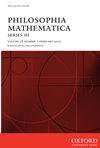Gödel’s Disjunctive Argument
IF 0.8
1区 哲学
Q2 HISTORY & PHILOSOPHY OF SCIENCE
引用次数: 0
Abstract
Gödel argued that the incompleteness theorems entail that the mind is not a machine, or that certain arithmetical propositions are absolutely undecidable. His view was that the mind is not a machine, and that no arithmetical propositions are absolutely undecidable. I argue that his position presupposes that the idealized mathematician has an ability which I call the recursive-ordinal recognition ability. I show that we have this ability if, and only if, there are no absolutely undecidable arithmetical propositions. I argue that there are such propositions, but that no recognizable example of one can be identified, even in principle.哥德尔的虚拟论证
哥德尔认为,不完全性定理意味着头脑不是机器,或者某些算术命题是绝对不可判定的。他的观点是,头脑不是机器,没有任何算术命题是绝对不可判定的。我认为,他的立场预设了理想化数学家具有一种能力,我称之为递归序数识别能力。我证明了我们有这种能力,如果并且只有当,不存在绝对不可判定的算术命题。我认为存在这样的命题,但即使在原则上,也无法确定一个可识别的例子。
本文章由计算机程序翻译,如有差异,请以英文原文为准。
求助全文
约1分钟内获得全文
求助全文
来源期刊

Philosophia Mathematica
HISTORY & PHILOSOPHY OF SCIENCE-
CiteScore
1.70
自引率
9.10%
发文量
26
审稿时长
>12 weeks
期刊介绍:
Philosophia Mathematica is the only journal in the world devoted specifically to philosophy of mathematics. The journal publishes peer-reviewed new work in philosophy of mathematics, the application of mathematics, and computing. In addition to main articles, sometimes grouped on a single theme, there are shorter discussion notes, letters, and book reviews. The journal is published online-only, with three issues published per year.
 求助内容:
求助内容: 应助结果提醒方式:
应助结果提醒方式:


